He waved his hand to her as the train moved off—she knew it among a score of hands that were waved to other girls from the platform of the car, for it held a letter which she knew was hers. Then he went inside the car to read it, doubtless, and she did not see him again. But she felt safe for him through the strength of what she called her love. What she called her God, always speaking the name in a deep voice and with the implication of a mutual understanding, would watch over him and keep him and bring him back to her. If with an empty sleeve, then he should have three arms instead of two, for both of hers should be his for life. She did not see, though, why she should always be thinking of the arm his father had lost.
There were not many letters from him, but they were such as she could have wished, and she put her whole strength into making hers such as she imagined he could have wished, glorifying and supporting him. She wrote to his mother glorifying him as their hero, but the brief answer she got was merely to the effect that Mrs. Gearson was not well enough to write herself, and thanking her for her letter by the hand of some one who called herself “Yrs truly, Mrs. W.J. Andrews.”
Editha determined not to be hurt, but to write again quite as if the answer had been all she expected. Before it seemed as if she could have written, there came news of the first skirmish, and in the list of the killed, which was telegraphed as a trifling loss on our side, was Gearson’s name. There was a frantic time of trying to make out that it might be, must be, some other Gearson; but the name and the company and the regiment and the State were too definitely given.
Then there was a lapse into depths out of which it seemed as if she never could rise again; then a lift into clouds far above all grief, black clouds, that blotted out the sun, but where she soared with him, with George—George! She had the fever that she expected of herself, but she did not die in it; she was not even delirious, and it did not last long. When she was well enough to leave her bed, her one thought was of George’s mother, of his strangely worded wish that she should go to her and see what she could do for her. In the exaltation of the duty laid upon her—it buoyed her up instead of burdening her—she rapidly recovered.
Her father went with her on the long railroad journey from northern New York to western Iowa; he had business out at Davenport, and he said he could just as well go then as any other time; and he went with her to the little country town where George’s mother lived in a little house on the edge of the illimitable cornfields, under trees pushed to a top of the rolling prairie. George’s father had settled there after the Civil War, as so many other old soldiers had done; but they were Eastern people, and Editha fancied touches of the East in the June rose overhanging the front door, and the garden with early summer flowers stretching from the gate of the paling fence.




